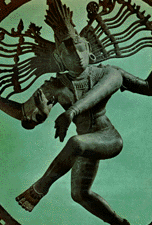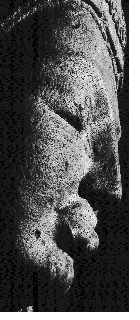 Siva is the dancer, he is always a-twirl. He spins things around, turns them
upside-down and inside-out.
His rhythms are Real.
Siva is the dancer, he is always a-twirl. He spins things around, turns them
upside-down and inside-out.
His rhythms are Real. His name cannot be uttered.
Every description is a wrong description.
Each of us has to find him in a personal
way.
His name cannot be uttered.
Every description is a wrong description.
Each of us has to find him in a personal
way.Hinduism's most ancient scripture, Rg Veda, has a hymn to the "Rowdy God" (raudra brahman). He is called "Rudra." Rudra means "The Howler."
In the hymn, Creation springs from Rudra's hand. He interrupts a crime.
He who is becoming Father takes shape from the mist. His own virgin daughter stands before him. Father sexually violates his daughter, violating also the integrity of the universe. As he reaches climax, an arrow strikes Father. Wounded, he recoils. His semen spills to Earth, collecting into a lake where life is born.
Sharva is the archer and it is his arrow that strikes Father. Sharva is fierce and cruel. Rudra is Sharva. Sharva serves King Bhava, lord of heaven and earth. Rudra is Bhava. Bhava uses Sharva to sustain right by punishing wrong.
When Sharva wounded Father, something right was sustained, but everything else was forever changed. The integrity of the universe had been irrevocably violated. Life was born from the violation.
There is something similar in the story of Adam's and Eve's disobedience; and the god who curses them has the wild in his voice, heard again by Job when it speaks from the whirlwind.
We first met the wild god in personal experience through the pain and punishment of childhood. As adults, we face harsh truths, courts of law, financial ruin and loneliness. Some of us are struck down by violence or afflicted with disease. We know that by the end of life, pain will probably prevail.
"I am food, food, food, and I am eater, eater, eater! I, who am food, eat the eater of food!"
Rudra is hunger and predation. He grabs and exploits. Those who fear him and fight him take on his form. He is a conscious person consuming and using others -- and realizing he too will be used and consumed.
Rudra is Bhairava who takes pleasure in destruction. He is Agni, Fire, here comforting, there the holocaust. He is Time that sustains and overthrows all things. He is Lingam, the erect phallus, aggressive, heedless and fecund.
Rg Veda sings of Long-Hair, the sage, who wore the faded yellow of wisdom. He was called Sun's Light. Rudra seized him and Long-Hair rode with the rush of the storm. Embraced by the god, he soared in the gale. Lightning poured the poison; the wind stirred it. Sharing with Rudra, Long-Hair drank poison from a cup.
The legendary Tristan and Isolde drank from the cup that held passion and poison. They betrayed the king, Tristan's master, Isolde's spouse. Renegades from the Day, they took refuge in Night. They consummated their lust under the moon and were themselves betrayed. They drank voluptuous abandonment, love and death.
Modern longhairs are rock stars intoxicated to the edge of oblivion. Torrid tales of the rich and famous decorate our supermarkets. What is the attraction? And why do we focus on images of wild emotions on our televisions and in our movies? Is it Rudra in us answering his call?
He masquerades as righteousness. He wears dark garments and presents a confessional demeanor. He is humiliated. Or is it self-humiliation? Humiliation and self-humiliation give Rudra his power. Those in the desolation of life address him. They seek him and welcome his presence. He rubs their wounds.
Rudra is contrary. Rudra is defiance. He rebels against his own nature and strikes his darkness against himself. He ignites in radiance.
Rudra becomes Siva. Siva is quick and bright. Rudra and Siva are two names of one god. They branch from the same unnameable root.
 Siva is the dancer, he is always a-twirl. He spins things around, turns them
upside-down and inside-out.
His rhythms are Real.
Siva is the dancer, he is always a-twirl. He spins things around, turns them
upside-down and inside-out.
His rhythms are Real.
Siva is playful. He appears as a man. He is a conqueror, a prophet, a peddler, a bum. He picks your pocket while you marvel at his glory.
He is the wanderer. His hair is long and braided. He mocks those who work in cities. He seduces the wives of priests.
He is everywhere and hidden, inexorable and capricious. He shreds the Absolute. He is the finality of accident.
To those he guides, he reveals the ways. He is Mahadeva, incomprehensible truth dwelling in the seed of consciousness. He is Sadasiva, discernment, originator of subject and object. He is Mahesvara, empathic wisdom that lies where differences cease. He is Isana, embodiment and master of all learning. He is Hara, displayer of wonders.
His is the finger that spindles the vortex, his the eye that sees itself seeing. His hands cradle those that spend themselves in love: fish that spawn to die, the artist drowning in creation, a mother feeding her body to her child. He is possibility that he weaves and unravels. Next-momentary and eternal, he has never simply existed. He is the sea against rock, wilfulness against fate, the copulation of contraries. He is my other self from whom I was estranged. He is me dancing with my demon. He longs in silence in my heart. He shines at the center of my inward searching mind.


 -- return to reference
-- return to reference